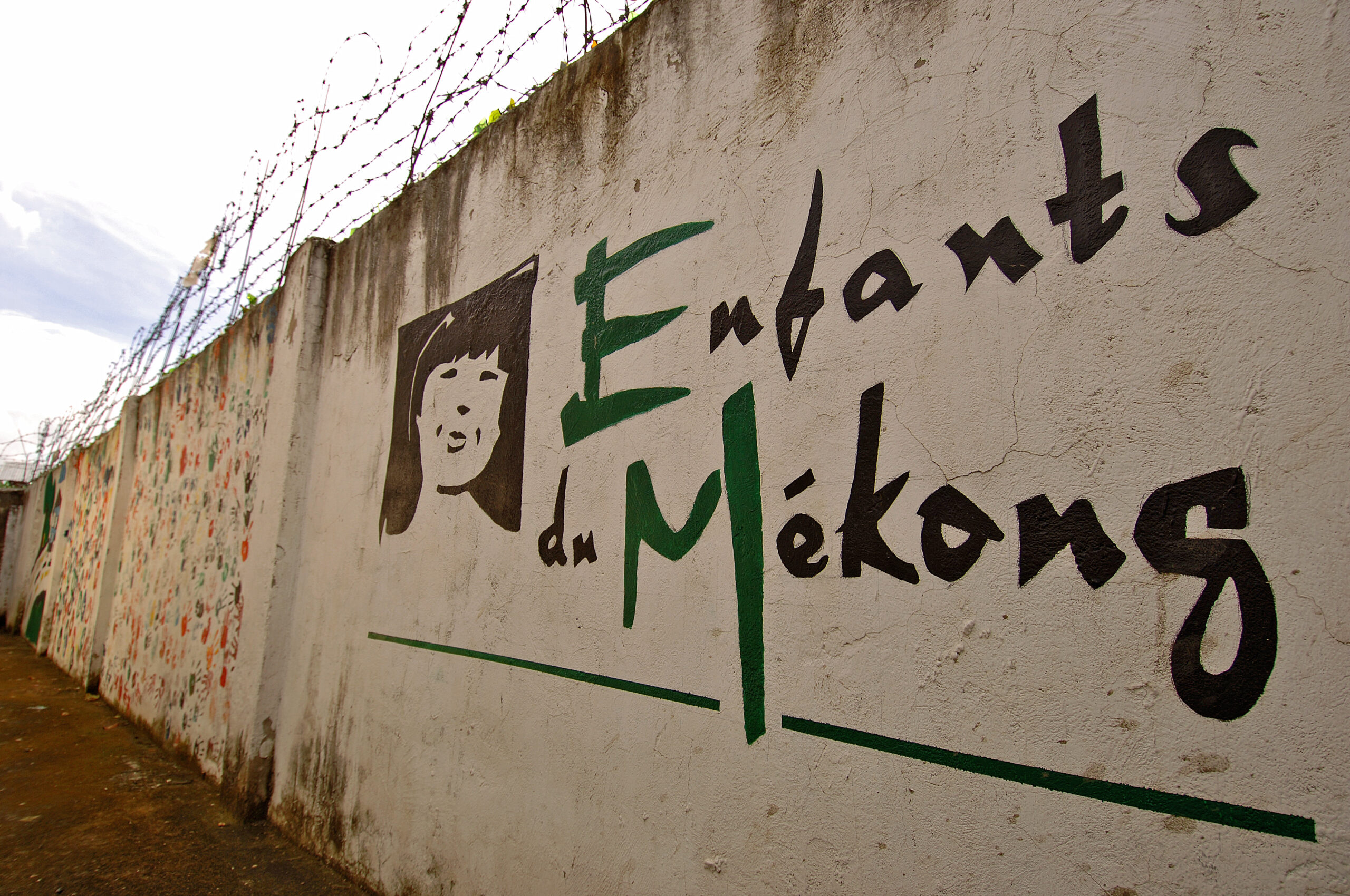
In the Eye of the Typhoon — the Philippines
Matthieu and Cécile Emery are “Bamboo” overseas volunteers in the Philippines. On December 16, 2021, at 6 p.m., they crossed paths with Typhoon Odette. For the young French couple who went to help the poorest people in the big city of Cebu, the shock was brutal. They were hit by a Typhoon that went 260 km/h. But despite the terrible disaster, they managed to seek company from their Filipino friends, who showed tremendous resilience and strength. Here, they share their thoughts with us.
On December 16, Thursday, Odette unexpectedly invited herself while we were planning a Christmas party for the sponsored children of the Inayawan slum in Cebu. Thunderous, it knocked on the gates of Cebu City after violently colliding with the islands of Mindanao and Bohol, wreaking havoc behind it. Odette (also called Rai in international code) is a super typhoon that devastated the eastern Visayas, the central region of the archipelago. Leyte, Negros and many other islands have suffered the same violent onslaught from an angry mother nature. The typhoon was very violent: it featured torrential, stinging rains and deafening winds exceeding 200 km/h, lifting the sheet metal (or even more robust) roofs, demolishing walls, sweeping away barriers, posts, carrying away commercial signs and exploding shop windows in its path. Inevitably, faced with such an outburst, we could only worry about the lives of everyone we’d met over the last few months.
The wait was long, but we know today, a month after Odette, that all the sponsored children of the Children of the Mekong association, the program managers, the Bamboo volunteers, the Filipino friends and colleagues are safe and sound, thanks to a true miracle. Unfortunately, some of the sponsored children lost loved ones during this tragedy.
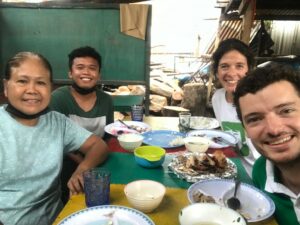
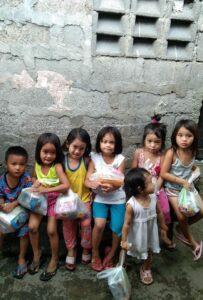
“WHERE THERE IS LIGHT, THERE IS HOPE!”
The Filipino locals taught us a special and important lesson. The day after the disaster, locals and neighbours came to the streets to clear the debris that was left behind after Typhoon Odette. They were all pro-active but also level-headed. But undeniably, the most incredible thing was the team spirit. This collective mobilisation and community spirit were truly incredible and many found a smile while they were working.
At the Children of the Mekong’s centre in Cebu City, the fifty-six sponsored students cleaned up the fallen twigs and branches and salvaged what they could with a smile on their faces. They were unexpectedly optimistic. When the sun casts its rays onto the centre once more, a student exclaimed, “As long as there is light, there is hope!”
What a great lesson! Despite the difficulties, they managed to muster courage and summon positivity to propel themselves forward. The Filippino people certainly embodied the values of courage and strength. We did not hear of any panic that we had expected. No screaming; no instances of looting in Cebu or anywhere else. And this was even though they were left with almost nothing: no electricity, no petrol and a potential lack of food. Yet the Filipinos queued up in an organised manner, waiting patiently for their turn to buy water. Water was one of the few accessible products in the aftermath of the disaster, but it too will soon run out. All canteens and food stores in our neighbourhood were closed.
“I WAS VERY AFRAID”
Most people in Cebu City had never experienced such trauma and were completely unprepared. But they were confident in their ability to bounce back. The poorest, who already had close to nothing, have now lost even the most basic essentials.
“December 16, 2021 was a memorable and painful day for us,” said Generie Baoya, a sponsored child of the Children of the Mekong. “My father, my brother, my cousins and my brother-in-law tried to hold the roof down against the strong winds, but warned us that it would soon be destroyed. We were almost trapped by the large trees lying on the ground and the debris of the destroyed houses. We fled to the shrubbery near our house and cried for help. We stayed there for about two hours, lying on the grass so as not to be hit by the flying roofs. We had two pregnant women with us, a five-month-old baby, a one-year-old and two, two-year-olds. I was very afraid.”
In Inayawan, another of the Children-of-the-Mekong’s centres is located in a slum around the Cebu City. A few families who have come to find refuge and seek comfort shared their experiences: “my roof is gone”, “my saucepan flew away”. Even then, they talked about such horrifying experiences with a smile. That led us to think: how do they continue to be so optimistic despite such horrifying experiences? Is it because their values in life are fundamentally detached from the pursuit of materialistic goods? And as such, the destruction of material shelter, food and resources does not bother them? Or is it they are simply glad to have survived the disaster?
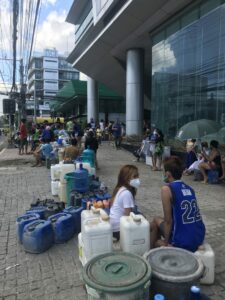
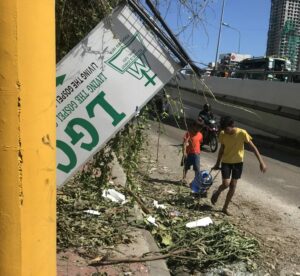
QUEUING IN ORDER TO SURVIVE
Filipinos were queuing in food shops, petrol stations (useful for electric generators or looking for food in towns in the north) and banks (cash became reintroduced to the payment system as payment terminals could not function without electricity). The queues were ridiculously long: locals wait for hours under the baking sun but yet were extremely calm and collected. The calm demeanour of the locals was in sharp contrast to the scorching heat. Supermarkets that were usually well-stocked, now run out of resources. Forty-eight hours after the typhoon, many petrol stations were shutting down. They too had run out of resources. Those who managed to secure a connection told us that the power may be out for a month. This meant that power may only be restored by the end of January 2022. On 23rd December, transport prices increased sharply given the lack of water. As Rean Joy Carillo explains, “water was extremely hard to find and the prices were exorbitantly high. I had to sleep in the street in order to get some”. Others who often visited the well for water must now pay 50 Filipino pesos (almost a euro) for a gallon (compared to 25 PHP previously). A majority of these people have low or no income and are now left with no shelter. How can some people take advantage of the situation and increase the price of a basic necessity?
Around 26th December, the telephone network was gradually restored in Cebu City, but there is still water and electricity is still rare. It is only without electricity did we realise how valuable the sunlight is! With a decreased flow of movement, the traffic in Cebu is unexpectedly organised, even without the use of traffic lights.
A UNITED TEAM
For the overseas volunteers, their work has continued: putting together bags of basic essentials, travelling, increasing food distributions, visiting young people and their families, spending time with them, and listening to and responding to their needs. Ultimately, the purpose of the mission is to be present and readily available. Overseas volunteers from unaffected areas arrived in areas damaged by the typhoon to form teams and help each other. Reinforcement volunteers were able to bring dissolvable tablets to make water drinkable, solar batteries, torches, wipes, batteries and cash. But above all, they brought a sense of togetherness and solidarity. More than the extra pair of hands, they motivated us and we pushed through together. In fact, after the typhoon, we set out on foot because the roads hadn’t yet been cleared. Even the habal-habal (local moped taxis) couldn’t get through. Odette has made some areas and districts totally unrecognisable.
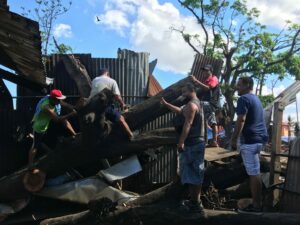
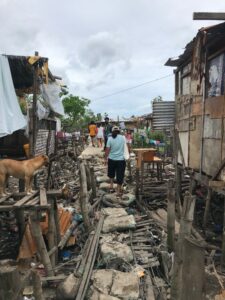
In the heavily-polluted Cebu City, every tree is important. However, with the typhoon, the green of the city has faded. In the small Children of the Mekong centre of Inayawan, the mango tree near the kitchen was devoured by the typhoon. This tore down the courtyard which was an incredibly essential place for the community. It was where parents sat around during training sessions, where lunch was prepared for children in nurseries, and where the Filipino volunteers used to organise and distribute food for one hundred and fifty local families… it must be rebuilt!
Ate Helen, manager of the Inayawan centre, is an incredible woman who is able to initiate, execute and facilitate this fantastic sponsorship programme. The programme currently looks after forty-nine sponsored children, ninety-eight older people, and around one hundred children in daycare and all of their parents. A whole community is able to benefit because of the efforts of Ate Helena as well as the organisation’s sponsor parents. Two days after the typhoon, Ate Helen was in utter shock and felt overwhelmed. We sat with her and tried to provide our support.
Fortunately, Ate Helen regained strength quickly. She galvanised everyone together to rebuild our home. As long as Ate Helen and her community are there, the spirit and joy of the neighbourhood will prevail. More than a month afterwards, the situation in the slums is gradually improving. Supermarkets are also gradually increasing the pace of re-stocking foods. That said, some are still left without power. The sponsored children and their families are those who will be affected the longest. In rural areas, some parents have also lost their boats or plantations. It will take twenty years for a mango tree to produce mangoes, seven years for coconuts and two years for bananas. There are hundreds of families who find themselves with no income in the medium term. But the material consequences must also not hide the trauma experienced by our sponsored children, as Generie Baoya told us about: “It was a really traumatic experience, a once-in-a-lifetime event and we will never forget it. It was truly awful! An unforgettable experience.”
Children of the Mekong is working to help the victims of typhoon Odette. We are currently supporting our sponsored children, their families and the community by providing basic necessities (water, food…). We are evaluating the damage with the aim of repairing and rebuilding housing as well our education infrastructure.
You can also help them by supporting the emergency project that has been set up.
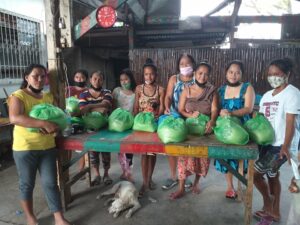

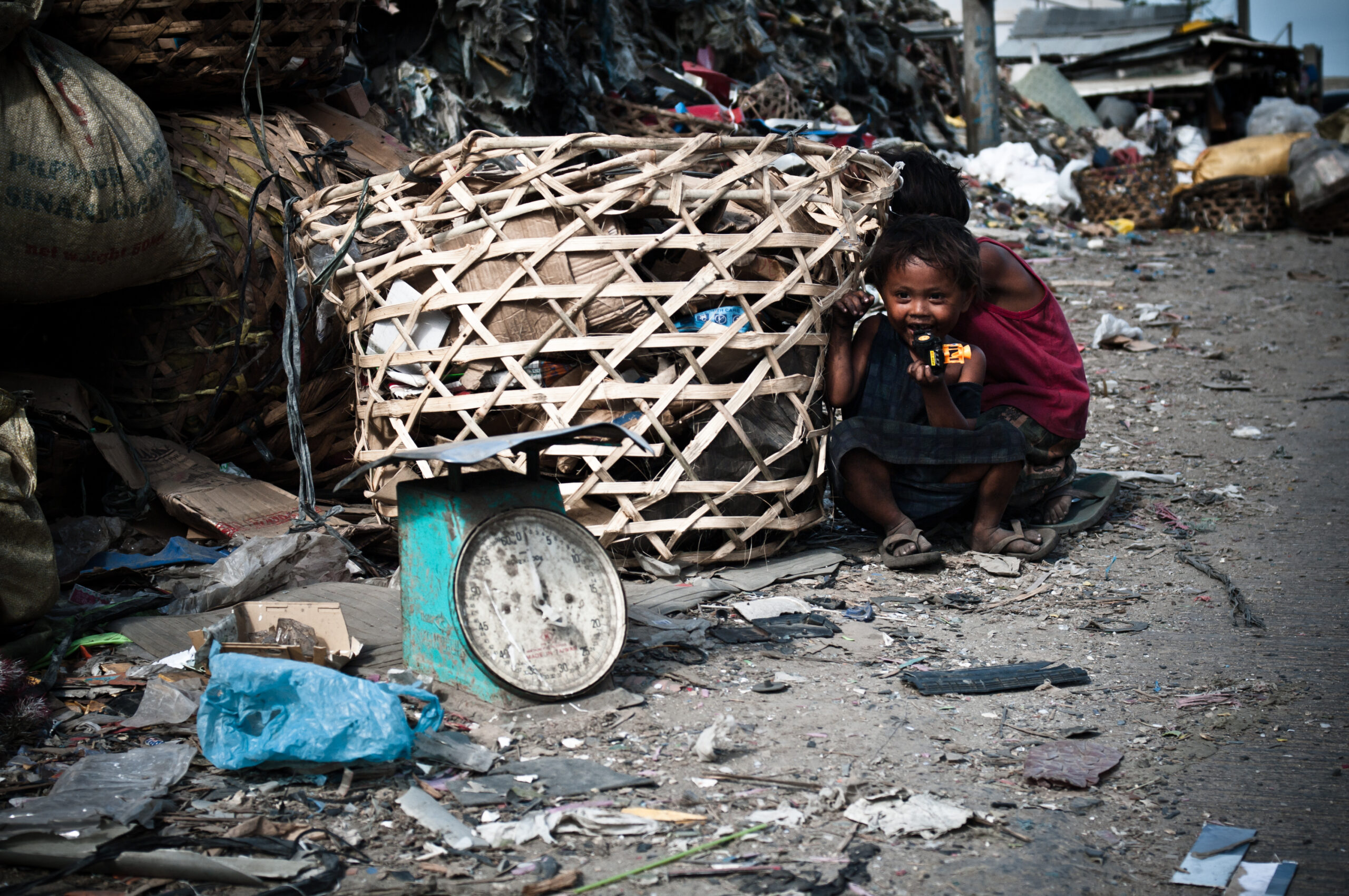
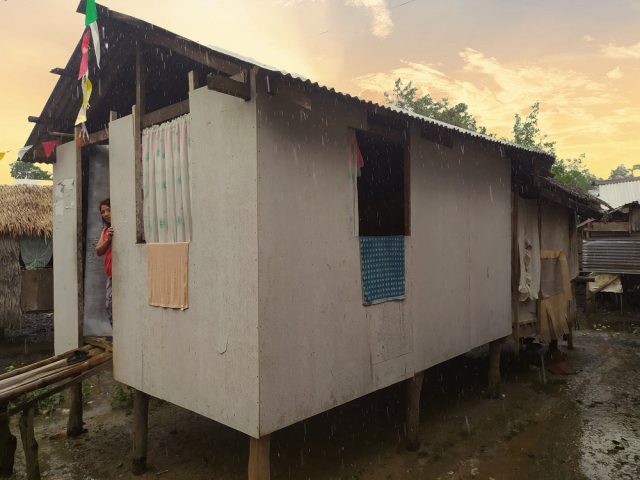
People of Samar: the Waray tribe
On the island of Samar and its neighbors in the east of the Philippines lives an ethnic minority, the Waray tribe. With their own […]
Learn more about our privacy policy here.


